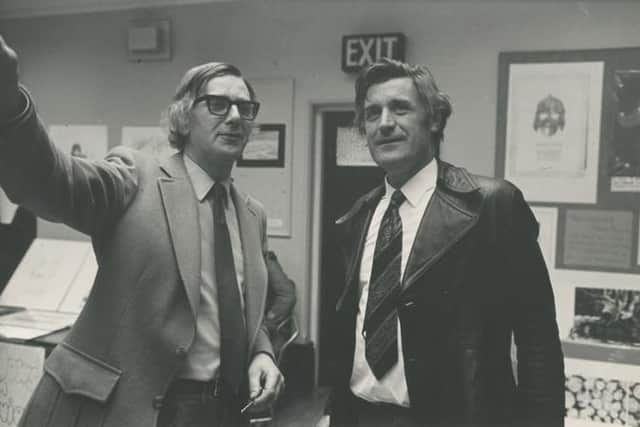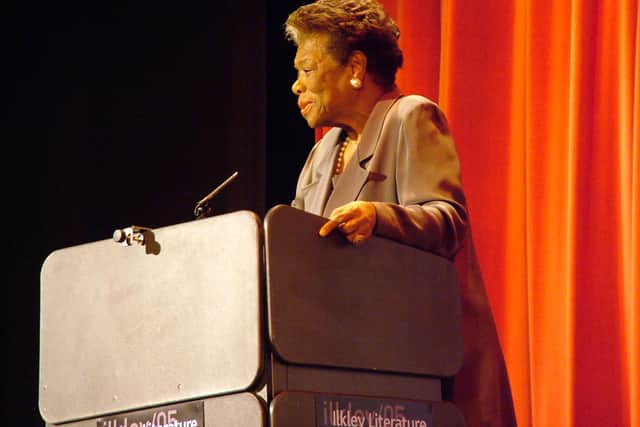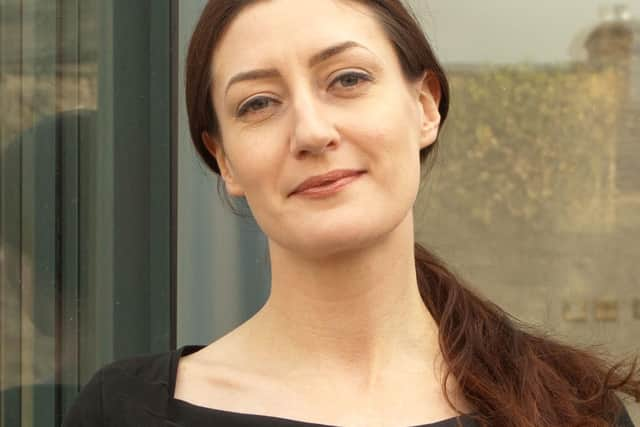50 years of Ilkley Literature Festival: From scepticism to attracting Philip Larkin, Ted Hughes, Alan Bennett and Margaret Atwood
The lack of mail gave him space to browse through brochures sent by the various arts festivals in Britain. It struck him that Cheltenham was the only one that was devoted to books. And so, Ilkley Literature Festival was born.
Bradford-born novelist and playwright JB Priestley wrote the foreword for the first festival brochure. While praising founder Dawson for programming “writers of genuine distinction,” Priestley noted the difficulties of book festivals: “Authors have little to show and are no treat as a spectacle.”
Advertisement
Hide AdAdvertisement
Hide AdHe was proven wrong in 1975 when poet Ted Hughes read Cave Birds, a collection that the festival had commissioned. The Yorkshire Post reported: “A blood-curdling scream pierced the heart of Ted Hughes’ new poem sequence at its world premiere at Ilkley’s King’s Hall. It came from a member of the audience. Shortly afterwards a woman vomited and was led out. There is no doubt that Cave Birds is a very powerful piece of writing.”


Dawson died last year. His son Tim wrote that the festival endures is testimony, in part, to his vision. From the outset, he insisted that programming should be to international standards.
Opened in 1973 by the poet W.H. Auden, Ilkley has been a dedicated champion of poetry ever since with appearances from luminaries including Philip Larkin, Ted Hughes, and Carol Ann Duffy. Literary icons who have headlined include Alan Bennett, Margaret Atwood, Hilary Mantel, Margaret Drabble, Fay Weldon, Harold Pinter, Bernardine Evaristo, and A.S. Byatt.
Dawson knew he had to ‘pack the big guns’ if the festival was to get off the ground. He was faced with scepticism from the locals, while being ignored by London publishers and national media, thanks to Ilkley’s “northern remoteness.”One incident that did hit the headlines, though perhaps for the wrong reasons, was in 1977. A huge bronze statue of the Minotaur by sculptor Michael Ayrton was unveiled in the town for the festival. It boasted, “commensurately large genitalia” resulting in petitions to protect the young and the elderly, and a headline in the Daily Express: “Beefing over 7 foot of Bull.”
Advertisement
Hide AdAdvertisement
Hide AdIn the first decades, the festival went through various financial struggles. In the 1980s, it was at risk of ceasing after falling out with a major funder. Its first female artistic director, June Oldham, in 1982 declared its future as “pretty bleak,” and by 1990 it was on a knife edge.


But by 1994, it was declared a “triumph” under new artistic director, Jonathan Davison. It had funds to commission new poetry from Ian Duhig, and Harold Pinter; Alan Ayckbourn and Willy Russell topped the bill. The 2000s and 2010s also saw growth, with the introduction of a Festival Fringe, with everything from poetry speed-dating to Japanese drumming.
Rachel Feldberg was festival director during much of that period, from 2003 to the end of 2018. She was born in Kent, the daughter of a harpsichord maker and music librarian, and worked in theatre, moving north as director of the Red Ladder theatre company, before taking the helm of the festival.
Rachel says: “My father’s family were German Jewish refugees from Berlin in 1933, and that’s been important to my whole career. My passion for diversity is rooted in my family’s experience of living under Hitler and managing to escape.”
Advertisement
Hide AdAdvertisement
Hide AdShe adds: “I will never forget Maya Angelou in Ilkley. She said she wanted her writing to enable people in the audience to see the world through the eyes of a young black woman in the American deep south. Whenever people say literature is ‘fluffy,’ I think of those words. Literature enables us to see other people’s views, to understand them, and feel their emotion. All the work I’ve ever done in my working life has been about that. The Nazis felt books were so dangerous, they burnt them, which tells you the power people see in books.”


One of Rachel’s proudest legacies was creating the children’s festival, nurturing new readers. “When Jacqueline Wilson, the former children’s laureate came, there were children saying ‘that’s the best day of my whole life’ - about an author. That really means something.”
Her legacy also includes the 50-mile Stanza Stones Poetry Trail with poet Simon Armitage, which runs across the Pennines from Marsden to Ilkley.
She speaks of the ability of books to enrich and sustain our lives. “My sister was a surgeon in the NHS, and she observed that her patients recovered much better if during their recovery they were interested or distracted, and that could be a book they desperately wanted to read or music they loved. Those things sustained them. As humans, it isn’t enough just to work, eat and sleep.”
Advertisement
Hide AdAdvertisement
Hide AdRachel sees herself as part of a continuum of a festival that is embedded in the town, and its audience. “As the largest, most highly regarded festival in the north, it was us, the Hay Festival, Cheltenham, and Edinburgh that leading authors went to, because Ilkley is a festival with long roots and great integrity. It’s always kept developing and doing new things, trying new challenges, that’s really important, and why it will continue to develop and has a bright future.”
Erica Morris, the current artistic director of Ilkley Literature Festival, took over the reins in 2019. Born in Leeds, the daughter of a bank worker and police officer, a love of books permeated Erica’s upbringing with weekly trips to the library.
After studying literature and language at Manchester University, she had a stint in bookselling, then worked as an event manager for the National Trust, and later on in regional theatre. Putting the two skill-sets together led her to literary festivals.
Erica says: “Books offer a way of living other lives. They are a time machine, a way of expanding your understanding of the world. Reading develops empathy, tolerance, and emotional intelligence, as it takes you outside the boundaries of your own experiences.”
Advertisement
Hide AdAdvertisement
Hide AdThe festival offered a way for Erica to be part of the book world, a London-centric industry, while staying home in the north. The job has helped her meet her “heroes” from actor David Suchet, to the beat boxer, Testament, who she admires for making words relevant to new, younger audiences.
But Erica has also faced big financial challenges. The pandemic decimated the festival’s income as the world of events shut for two years. “We’re here at 50, but I don’t think people realise how close we were to not making this milestone.
"We weren’t sure at any point during those two years whether we’d still be in existence. We are funded in part by the Arts Council, but 60 per cent of our income to keep the whole organisation going came from ticket sales, sponsorship, and donated income associated with the two-week festival.”
An Arts Council Cultural Recovery Grant is the only reason it held onto the small team of four that runs the entire organisation – which delivers year-round school and community programmes, alongside the months of planning for the two-week festival.
Advertisement
Hide AdAdvertisement
Hide AdThe latest challenge is in the rise of large-scale book theatre tours, which are lucrative for big name celebrities to reach huge audiences. Erica says: “It is quite a worry when the starry name authors get siphoned off to do big theatre tours, because they’re the ones that help support the debut writers and the niche events that are really interesting.
“The writer isn’t someone you know from television, you’ve probably never heard of them before, but they are appearing in your town so you go along and then discover an incredible writer or a subject that you have never been exposed to before. That kind of experience won’t exist unless we can keep attracting the big household names as well. The future for literature festivals is tricky.”
Still, the festival impacts positively on the town’s economy, as well as contributing to Ilkley’s enviable status as a Sunday Times Best Place to Live. Erica says: “Our festival not only develops pathways for young creatives, it can enrich lives and enrich a place.“We programme a broad church – novelists and poets yes, but also philosophers and engineers and biologists and politicians. It’s a chance to hear people who are eminent in their particular field share their knowledge and passion. It expands what your aspirations can be, or at least your understanding of the wider world and what’s out there. I think that curiosity and openness creates a better community as well.”
She adds: “I feel I’ve inherited this grand house, handed down by the previous generations of directors. I hugely admire the work of all those who have supported, volunteered, and worked at the festival over 50 years and I’m proud we are still here to carry on their vision and ambition.
Advertisement
Hide AdAdvertisement
Hide Ad“I want to make sure I hand the Ilkley Literature Festival to the next person in a better shape than the one it has had to take on to endure the last few years. We’re going to build back, grow, expand, and change in a way that the festival always has, but keeping true to the spirit that has animated it since 1973.”
The 2023 Ilkley Literature Festival programme is announced on 17 August. Tickets are on sale from 29 August (Friends priority booking is available from 23 August). ilkleyliteraturefestival.org.uk